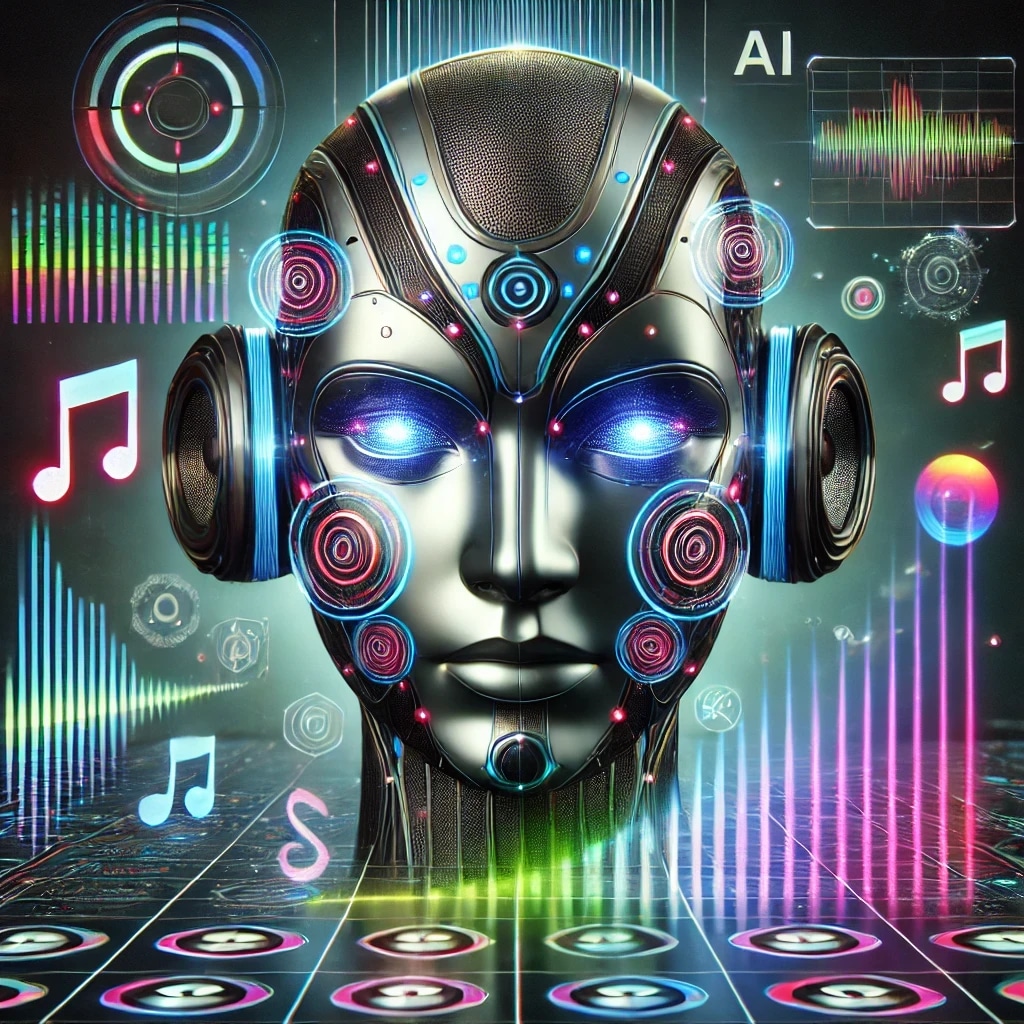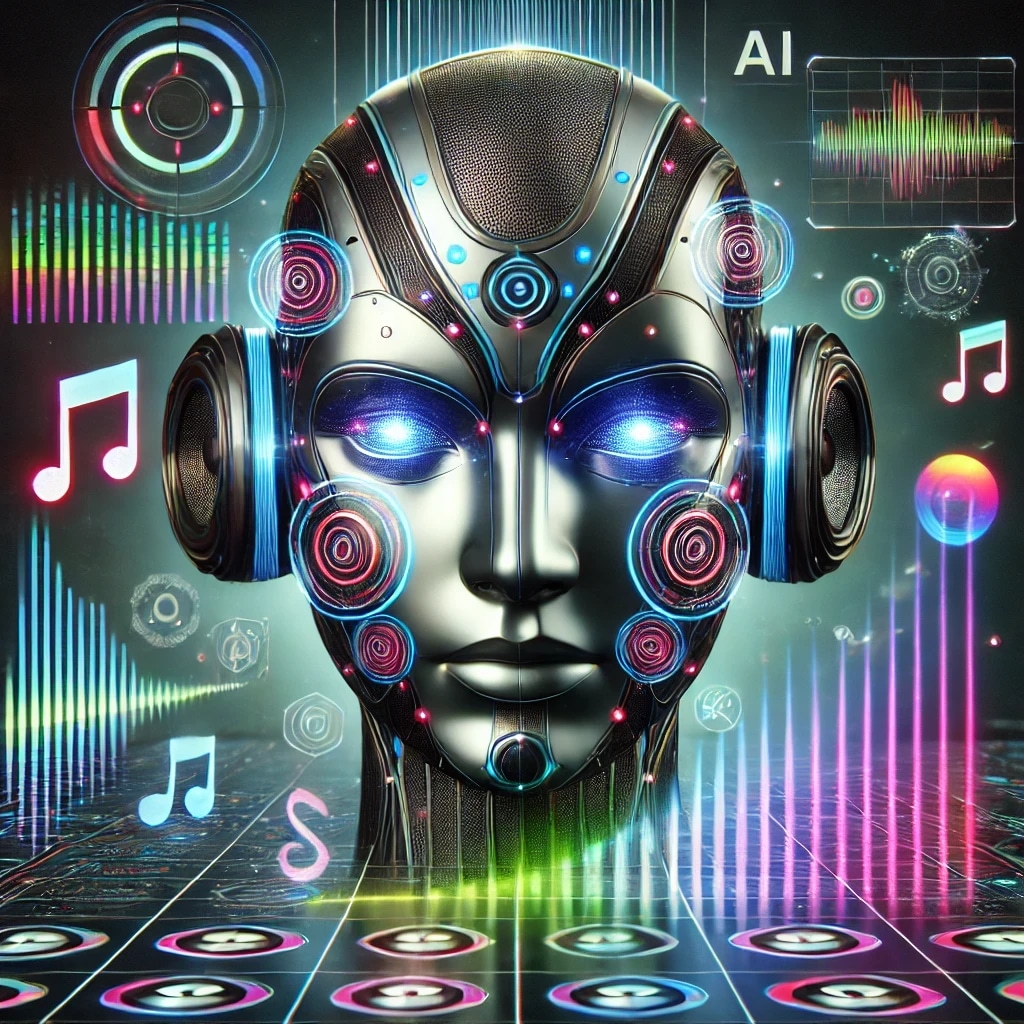
What is an AI sound generator?
AI sound generators are reinventing everything from YouTube content creation to virtual assistants
An AI sound generator uses artificial intelligence to generate speech, sound effects, and even music. They’re incredibly versatile. For example, they power voices for virtual assistants, help craft learning materials, or help Youtube creators produce content voiceovers.
In this article, we'll look at how AI sound generators work, what they are used for, as well as where they could be going in the future.
Want to dive in straight away? Get started with ElevenLabs’s AI voice generator.
Key takeaways
- AI sound generators learn from human voices to convert text into human-like speech
- They work via a combination of data collection, feature analysis, and ML model training
- To choose the right AI sound generator, consider customization features, cost, and ease of integration amongst other factors
- ElevenLabs, Synthesia, PlayHT, Murf.AI, and Speechify are some of the best AI sound generators on the market
AI sound generators: an overview
AI sound generators are innovative tools that leverage artificial intelligence to create a wide range of sound effects. These generators utilize complex algorithms to simulate various sounds, from natural environments like rainforests and ocean waves to urban noises such as traffic and crowd sounds. They can also produce unique sound effects for video games, movies, and other multimedia projects.
Unlike traditional sound libraries, AI sound generators can customize sounds based on specific parameters. Users can adjust aspects like pitch, volume, and duration to fit their needs precisely. This flexibility allows for a high degree of customization, making AI generators a go-to solution for creators seeking specific soundscapes or effects.
Furthermore, AI sound generators can learn from a vast database of sounds. They analyze patterns and characteristics of these sounds to generate new, unique effects. This capability not only speeds up the sound creation process but also opens up new possibilities for sound design.
For businesses and creators, AI sound generators offer a cost-effective and efficient way to access high-quality sound effects. They eliminate the need for expensive field recordings and the limitations of pre-existing sound libraries. As AI technology continues to evolve, these generators are set to become even more sophisticated, further revolutionizing the field of sound design.
How do AI sound generators work?
AI sound generators leverage advanced algorithms to create or replicate sounds, including human voices, musical instruments, and environmental sounds. These systems transform text or input parameters into lifelike audio outputs.
Step 1: data collection
The process begins with gathering a large dataset of audio recordings. These recordings serve as the training material for the AI, encompassing a wide range of sounds, voices, and tonal variations to ensure versatility and accuracy.
Step 2: feature analysis
Next, the AI analyzes the audio features of these recordings, such as pitch, tempo, and timbre. This analysis helps the AI understand the characteristics that make each sound unique.
Step 3: machine learning model training
Using the analyzed data, a machine learning model is trained to recognize patterns and understand how different audio features are combined to create specific sounds or voices.
Step 4: synthesis
Once trained, the AI can generate new sounds based on the input it receives. For voice generation, this involves converting text into speech that mimics human intonation and emotion. For other sounds, it may require simulating the conditions under which the sound occurs.
Step 5: refinement
Finally, the generated audio is refined to enhance its quality and realism. This step may involve adjusting certain parameters, filtering noise, or applying effects to make the sound more authentic.
Through these steps, AI sound generators can produce highly realistic and varied audio outputs, from speaking in different languages to mimicking the sound of rain.
What are the best AI sound generators in 2024?
In 2024, AI sound generators have become indispensable tools for creators across various industries. These advanced platforms offer unparalleled flexibility and creativity in sound production. Among the top contenders are ElevenLabs, Plugger.ai, and AI Lab. Each platform has unique features, pros, and cons, catering to different needs in sound effect generation.

ElevenLabs
ElevenLabs is an advanced AI sound generator known for its ability to create realistic and customizable voices.
Key Features:
- Realistic voice generation
- Customizable voice tones and styles
- High-quality audio output
Pros:
- Produces highly realistic voices
- Offers a wide range of customization options
- User-friendly interface
Cons:
- May require a learning curve for new users
Plugger.ai
Plugger.ai is known for its broad spectrum of sound effects, from environmental sounds to synthesized effects, making it a versatile choice for multimedia projects.
Pros
- An extensive sound library covering a wide range of sound effects.
- Easy to navigate for both beginners and professionals.
- Highly customizable, allowing precise adjustments to sound parameters.
Cons
- Requires a stable connection for access and generation.
- Not as advanced as platforms that specialize in voice generation.
AI Lab
AI Lab by Wondershare is another prominent player, offering a suite of AI-driven tools including a sound effect generator that excels in creating both ambient sounds and specific sound effects.
Pros
- Generates a variety of sounds, from ambient to specific effects.
- Easily integrates with other Wondershare products for seamless workflow.
- Simplifies the process of creating and editing sound effects.
Cons
- New users may need time to fully utilize its features.
- Best used within the Wondershare ecosystem, which might limit its use for some.
Each of these AI sound generators brings something unique to the table. Whether you're looking for lifelike voiceovers, diverse sound effects, or seamless integration with video editing tools, there's an option available to meet your needs in 2024.
How to choose the right AI sound generator
Selecting the right AI sound generator is crucial for ensuring your audio content meets quality and functionality expectations. This decision impacts the effectiveness of your projects, from enhancing user engagement to improving accessibility.
High-quality audio output is essential for a realistic and engaging listening experience. Listen to samples provided by the AI sound generator to assess its quality. Pay attention to clarity, naturalness, and the ability to convey emotions or specific atmospheres.
If your project involves speech generation, look for a tool that offers a wide range of languages and voices. Diversity in accent, tone, and gender ensures you can cater to a broad audience and personalize the audio content to fit various contexts.
What’s more, the ability to customize audio outputs is vital for tailoring content to your needs. Evaluate the extent to which you can modify pitch, speed, and other parameters. More advanced tools may also offer emotional tone adjustments, making the AI voices more dynamic and engaging.
Your chosen AI sound generator should also easily integrate with your existing workflow and platforms. Compatibility with different operating systems and software, along with API access for developers, can significantly streamline your production process.
Finally, understand the pricing structure and any licensing requirements associated with using the AI sound generator. Consider both upfront costs and any ongoing fees for access to premium features or voices. Ensure the tool offers good value for your investment.
The benefits of AI sound generators
AI sound generators offer transformative advantages for various industries, enhancing the way we interact with technology and consume media.
By employing sophisticated algorithms, these tools provide efficiency, customization, and accessibility that were previously unattainable.
AI sound generators can produce extremely realistic and high-quality audio outputs. Whether it's replicating human voices for virtual assistants or generating natural environmental sounds, the realism achieved significantly improves user experience.
AI sound generators also allow for rapid scaling of audio production. Once a system is trained, it can generate countless variations of sounds or voices with minimal additional input, supporting large-scale projects with ease.
But that’s not all.
Creating professional audio content traditionally requires significant investment in talent and studio time. AI sound generators minimize these costs, making high-quality sound production accessible to more creators and businesses.
Plus, they offer unprecedented customization options. Users can adjust voices, tones, and sounds to meet specific requirements, providing a personalized experience for each project or application.
AI sound generator use cases
AI sound generators and AI-generated voices offer significant benefits across a range of sectors, including e-learning, voice assistants, entertainment, and gaming. Using an AI voice can significantly improve the user experience in these areas.
As AI voice generation technology evolves, these generated voices are becoming increasingly more realistic and adaptable. The rising popularity of AI voices and voice AI technology underscores the vast potential and growing importance of this innovative field.
Let’s examine the use of AI sound generators in these sectors.
E-learning and educational content
AI sound generators actively enhance the learning experience in the e-learning sector, creating engaging and accessible audio content for educational materials.
Voice assistants and chatbots
AI sound generators significantly improve how users interact with voice assistants and chatbots (like Siri and Alexa). By providing natural-sounding voices, these tools make technology more approachable and easy to use.
Entertainment and gaming
AI sound generators produce realistic AI generated voice sound for video games or voiceovers for short-form content like YouTube and TikTok.
Understanding the rise of AI sound generators
The audio industry is experiencing a major transformation, thanks to artificial intelligence. AI sound generators, powered by complex algorithms, are redefining the capabilities of voice technology. These tools go beyond simple ai text-to-speech conversion. They expertly replicate human speech patterns, generate sound effects, and even compose music.
In essence, AI sound generators are setting new standards in how we create and interact with sound.
Ethical considerations and challenges
While AI sound generators hold great promise, they also raise significant ethical issues. Concerns about voice cloning, obtaining proper consent, and the risk of misusing the technology to create deepfakes are important topics that need careful consideration.
Voice cloning and consent
Voice cloning technology, a feature of AI sound generators, requires careful handling of consent. Ensuring that individuals agree to have their voices cloned and used is vital to maintaining ethical standards and respecting other human voices and their personal rights. This aspect of AI voice generation calls for clear policies and responsible use to prevent unauthorized or unethical applications.
Misuse and deepfakes
The potential misuse of AI sound generators, particularly in creating deepfakes, is a pressing concern. These tools can fabricate audio that is convincingly real, leading to misinformation or impersonation. It's crucial to address these risks, possibly through regulation and technology that can detect synthetic media, to reduce the negative impacts of this technology.
Final thoughts
AI sound generators represent a significant advancement in digital media, transforming how we create and interact with audio content. By simplifying the production of realistic voices and sounds, these tools democratize access to high-quality audio for creators, educators, and businesses alike.
Create your own free sound effects using ElevenLabs Free Sound Effects Generator.

FAQs
Explore articles by the ElevenLabs team

AI generated sound effects are here
If you can describe it, we can generate it

Unpacking ElevenAgent's Orchestration Engine
A look under the hood at how ElevenAgents manages context, tools, and workflows to deliver real-time, enterprise-grade conversations.

